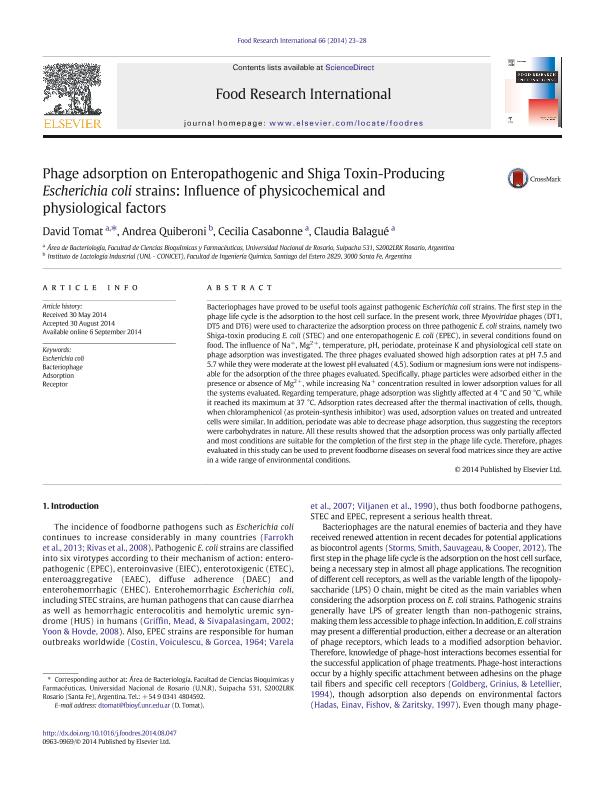Artículo
Phage adsorption on Enteropathogenic and Shiga Toxin-Producing Escherichia coli strains: influence of physicochemical and physiological factors
Fecha de publicación:
12/2014
Editorial:
Elsevier Science
Revista:
Food Research International
ISSN:
0963-9969
Idioma:
Inglés
Tipo de recurso:
Artículo publicado
Clasificación temática:
Resumen
Bacteriophages have proved to be useful tools against pathogenic Escherichia coli strains. The first step in the phage life cycle is the adsorption to the host cell surface. In the present work, three Myoviridae phages (DT1, DT5 and DT6) were used to characterize the adsorption process on three pathogenic E. coli strains, namely two Shiga-toxin producing E. coli (STEC) and one enteropathogenic E. coli (EPEC), in several conditions found on
food. The influence of Na+, Mg2+, temperature, pH, periodate, proteinase K and physiological cell state on phage adsorption was investigated. The three phages evaluated showed high adsorption rates at pH 7.5 and 5.7 while they were moderate at the lowest pH evaluated (4.5). Sodium or magnesium ions were not indispensable for the adsorption of the three phages evaluated. Specifically, phage particles were adsorbed either in the presence or absence of Mg2+, while increasing Na+ concentration resulted in lower adsorption values for all
the systems evaluated. Regarding temperature, phage adsorption was slightly affected at 4 °C and 50 °C, while it reached its maximum at 37 °C. Adsorption rates decreased after the thermal inactivation of cells, though, when chloramphenicol (as protein-synthesis inhibitor) was used, adsorption values on treated and untreated
cells were similar. In addition, periodate was able to decrease phage adsorption, thus suggesting the receptors were carbohydrates in nature. All these results showed that the adsorption process was only partially affected and most conditions are suitable for the completion of the first step in the phage life cycle. Therefore, phages evaluated in this study can be used to prevent foodborne diseases on several food matrices since they are active in a wide range of environmental conditions.
Palabras clave:
Escherichia Coli
,
Bacteriophage
,
Adsorption
,
Receptor
Archivos asociados
Licencia
Identificadores
Colecciones
Articulos(CCT - ROSARIO)
Articulos de CTRO.CIENTIFICO TECNOL.CONICET - ROSARIO
Articulos de CTRO.CIENTIFICO TECNOL.CONICET - ROSARIO
Articulos(INLAIN)
Articulos de INST.DE LACTOLOGIA INDUSTRIAL
Articulos de INST.DE LACTOLOGIA INDUSTRIAL
Citación
Tomat, David Damian; Quiberoni, Andrea del Lujan; Casabonne, Cecilia; Balagué, Claudia; Phage adsorption on Enteropathogenic and Shiga Toxin-Producing Escherichia coli strains: influence of physicochemical and physiological factors; Elsevier Science; Food Research International; 66; 12-2014; 23-28
Compartir
Altmétricas




